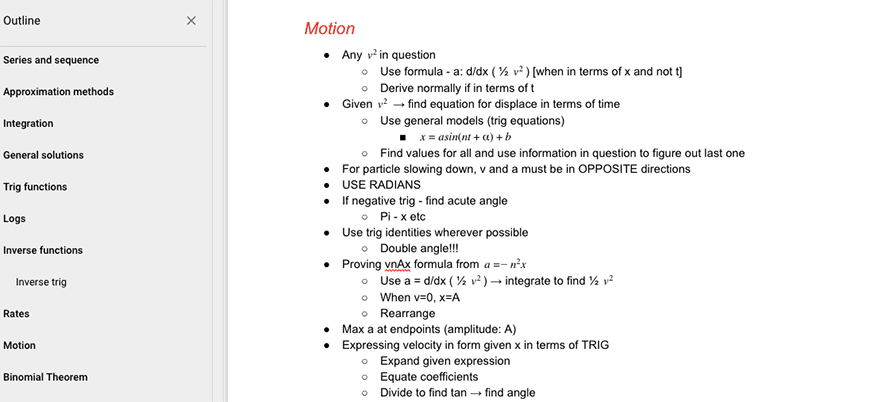Welcome to Matrix Education
To ensure we are showing you the most relevant content, please select your location below.
Select a year to see courses
Learn online or on-campus during the term or school holidays
Learn online or on-campus during the term or school holidays
Learn online or on-campus during the term or school holidays
Learn online or on-campus during the term or school holidays
Learn online or on-campus during the term or school holidays
Learn online or on-campus during the term or school holidays
Learn online or on-campus during the term or school holidays
Get HSC Trial exam ready in just a week
Get HSC exam ready in just a week
Select a year to see available courses
Science guides to help you get ahead
Science guides to help you get ahead

Are you struggling with some Maths Standard 2 questions? Well, don’t worry! In our Beginner’s Guide to Year 12 Maths Standard 2, we will break down all of the NESA learning outcomes and provide you with some practice questions to help you tackle everything.
Now that you are in Year 12, it is essential that you build on your foundational knowledge from Years 7-11 and grow that knowledge further.
This Guide introduces through Year 12 Maths Standard 2 HSC content and skills that you need to master!
We will break down each concept into clear, concise and manageable chunks of theory, and provide you with some practice questions and worksheets.
Our purpose for writing this guide is to create clarity around the Year 12 Maths Standard 2 Syllabus.
Our guides aim to clarify any confusion you might have with the syllabus topics!
We break down the topics and provide challenging questions at the end of each article to help you prepare for the HSC.
We also examine concepts behind different questions, instead of examining pure calculations. This is because we believe that it is beneficial for you to understand Maths, as opposed to simply listing steps to the right answer.
This is our philosophy behind our Matrix Maths Method.
| Step | Matrix Method | |
| 1 | Theory | Developing a thorough understanding of concepts is the first step to mastering Maths. Learn from Matrix Theory Books that are carefully structured to help you understand even the most complex stuff! |
| 2 | Application | Memorising formulas will only get you so far. Consolidate your understanding by learning how to apply concepts and techniques to solve problems. |
| 3 | Examples | Work through examples that will actually be in your exam. You’ll learn how to present your solution for maximum marks in exams. |
| EXAM SKILLS (50% of COURSE TIME) | ||
| 4 | Concept Checks | Learn the most efficient problem-solving techniques with different types of exam-style questions. |
| 5 | Workbook | Practice sharpening your skills with hundreds of exam-style questions. It’s important to keep practising as this is the only way to find the right balance between speed and accuracy. |
| 6 | Quiz and feedback | Weekly quizzes and feedback provide you with opportunities to identify your gaps and address them ASAP. |
| 7 | Topic test | Working under exam conditions will boost your confidence for the real thing. Learn from your mistakes and fill your gaps so you are continually improving. |
| The Matrix Method for Maths is our proven process to ensure you develop knowledge and skills. | ||
In Year 12 Maths Std, many students come across these issues:
For example: Find the \( x \) for the following quadratic equation:
\( y = x^{2} = 6x = 16 \)
Students who struggle with this question may be comfortable with factorisation. However, they might be unfamiliar with other Mathematical methods like completing the square of the quadratic formula. These are necessary to solve the question.
For example: Find the turning point of the parabola \( y = x^{2} + 5mx + m \).
To solve this question, students need to have a strong conceptual understanding of the link between the turning point, parabola, and quadratic inequalities.
So, now that we know what the most common Maths issues are, let’s examine how you can overcome these issues!

Our HSC experts will break down Mathematical concepts into manageable chunks through our structured and engaging lessons. Learn more about Year 12 Maths Std 2 Course now!
Learn to solve any Maths question!
Expert teachers, weekly quizzes, one-to-one help! Ace your next Maths Std 2 assessment with Matrix+ Online.
© Matrix Education and www.matrix.edu.au, 2025. Unauthorised use and/or duplication of this material without express and written permission from this site’s author and/or owner is strictly prohibited. Excerpts and links may be used, provided that full and clear credit is given to Matrix Education and www.matrix.edu.au with appropriate and specific direction to the original content.